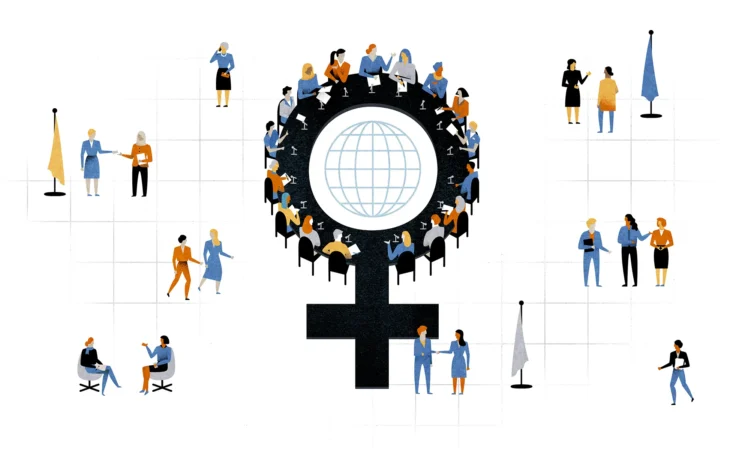17 May 2025, NIICE Commentary 10940
Shradha A Joshi
June 24 is marked as the International Day of Women in Diplomacy by the United Nations General Assembly to observe the International Day of Women in Diplomacy to promote the full and equal participation of women on the ground of diplomacy. “The UN reaffirmed that the participation of women, on equal terms with men, at all levels of decision-making is essential for the achievement of sustainable development, peace and democracy.” Eleanor Roosevelt, the former American First Lady, can be remembered as one of the pioneer American public diplomats of the twentieth century and expanded the field of public diplomacy by advocating for civil groups and causes, in addition to leading American cultural diplomacy activities. She was made to believe, and her observation too showed that international politics is a man’s world that dominated the fields of politics, diplomacy, defence and international civil services. In this regard, the twenty-first century is no different. Apart from the few representations, there is little evidence that states that women have been assigned much of a role in formulating and shaping the foreign policy of a country.
Women’s involvement in the field of foreign policy and diplomacy has been frightful. The field of world politics and international affairs showcases the underrepresentation of women. The percentage of women in senior positions and several departments and agencies at the UN is approaching 50%; however, women's representation is far lower in several areas, such as international tribunals, where women occupy only 19% of permanent positions; and until now there has never been a female Secretary-General of the United Nations. The public's perception of the "diplomat" has traditionally associated it with the "man," and the current underrepresentation of women in the diplomatic community serves to perpetuate these misconceptions. It’s still debatable whether the implementation of feminist foreign policy could help increase women's representation in top diplomatic jobs at the state level, as well as in international negotiations and organisations.
Historically, Feminist Foreign Policy (FPP) originated from the UN Security Council Resolution 1325, the Beijing Declaration and Platform for Action, and other international accords that vouched for promoting gender mainstreaming. It was in the year 2014 when Margot Wallstrom the then Sweden’s foreign minister, announced that her country would adopt to feminist foreign policy, not easily, but it got accepted with scepticism. Many in the diplomatic world to date tend to avoid the word “feminism”, or rather, play smart. The concept initially was very niche, more like a Nordic effort in bringing women’s rights and representation to a wider and global arena. After almost a decade, 16 countries from diverse geographies of Europe, Latin America and Asia have publicly pursued feminist foreign policy and are growing increasingly upfront for state actors to prioritise people and planet over war for economic and military dominance, and get along with cooperation rather than conflict.
Canada, France, Mexico, Spain, Luxembourg, Germany, Libya, Argentina, and Chile have all pledged to promote gender equality in their development and foreign policy. The International Center for Research on Women, or ICRW defined it as "prioritizing peace, gender equality and environmental integrity; enshrines, promotes, and protects the human rights of all; seeks to disrupt colonial, racist, patriarchal and male-dominated power structures; and allocates significant resources, including research, to achieve that vision".
Feminist policies aren’t merely incorporating a focus on women and girls; rather, they investigate how government institutions might be altered to achieve gender equality and opportunities as an objective of foreign and security policy. In today’s world of multipolarity with the presence of chaos and conflict, the implication of FFP would be absolutely relevant as it recognises the need to combine diplomacy with development to meet individual, communal, and national security challenges. Its focus remains on establishing human security globally through dialogue and diplomacy. It integrates gender equality into national foreign policy and international security institutions.
In South Asia, the official oratory in diplomacy focuses on 'gender equality '; at the same time, the feminist movement has been vocal in foreign policy in global feminist solidarity initiatives during and after the United Nations International Women's Decade (1975-1985).
“Diplomacy can be gender-neutral, but it should not be gender-blind; it must rely on the middle ground, achieving peace over conflict, emphasizing good negotiation, accepting diversity, and rejecting hierarchies and antiquated notions of hegemony,” Nirupama Menon Rao, former Indian foreign secretary remarked her views during a panel discussion in a gender sensitive foreign policy in New Delhi.
Feminist concepts in Nepal are understood in the context of the country's complex socio-political and economic fabric, which includes many marginalised issues. However, FFP is fundamentally about inclusion, and inclusiveness in policymaking that is critical for achieving equal results." Reflecting women’s interests" in foreign policy entails going beyond representation and including rights and resources issues. Furthermore, women are guaranteed the right to participate in all governmental entities under the concept of proportionate participation, with much emphasis on equality. Thus, the new constitution has opened windows for women to participate and lead in many spheres, including foreign affairs. Despite these good changes, women's representation in a few fields remains low. In Nepal, to date, women hold a small share of higher-level posts in the Foreign Service and diplomacy. Thus, FFP provides an ample opportunity to pave itself in proving a gender equality nation, which is quintessential for peace and prosperity.
Shradha A Joshi is currently pursuing an MPhil/PhD in International Relations and Diplomacy at Tribhuvan University.

